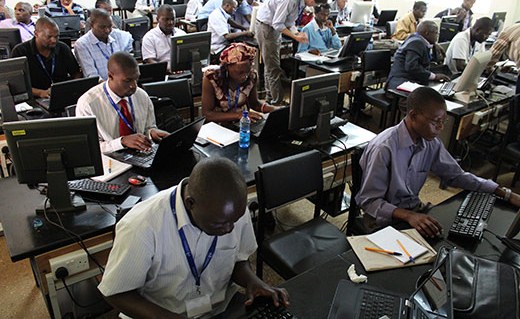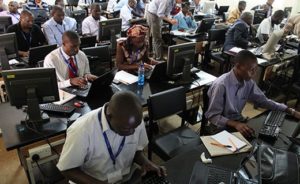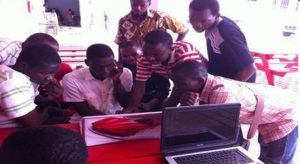People with attitudinal change not funding will be the most significant driver of ICT on Nigerian university campuses writes SEGUN ORUAME
Universities are the bastions of knowledge. In Nigeria, universities constitute the toughest strongholds to resistance to new ways of pursuing knowledge. While many universities around the world, particularly those in the western hemisphere, have leveraged on ICT to deepen and expand the frontiers for sharing and acquiring knowledge, Nigeria universities, particularly the publicly funded ones, remain at the periphery of ICT adoption.
As a passing research by Knowhow Media Team proved, universities opting to leverage on ICT to improve efficiency face multiple challenges: funding; unwillingness of the top hierarchy of the university community to change/adopt ICT; incorrigible belief that ICT is costly and complex; and unwillingness of government – the funding organ- to ensure compliance to a national ICT policy initiated to encourage diffusion and adoption of ICT.
Funding is a national dilemma that most government institutions must contend with and is not peculiar to the university community. Often, because the decision to integrate ICT into the university faculties as well as the overall administration is that of the senate – the highest decision making organ in a university – funding becomes a pliable excuse to a university administration that is shy of ICT.
Of the 15 universities visited in the course of this research, only one showed some level of receptiveness to ICT – its senate members recently agreed to have meetings’ agenda and resolutions emailed to them. While many teaching staff, particularly those that constitute the decision making organs in the universities could boast of owning an Apple Ipad or some other tablets, these tools are hardly used as functional work tools but best regarded as technology ‘wanna-be’ items.
“How can that kind of senate be committed to having ICT drive anything in the school system. They themselves do not believe in ICT. When they go abroad they see these things work but somehow believe our own environment is not ready for such things,” one senior staff in the administrative arm of one of the universities lamented.
Typically, universities with some level of ICT presence; usually in terms of having digital libraries or having bandwidth supply to connect some minimal academic operations such as uploading courses on offered by the faculties often rely on foreign donors or support to deploy and sustain such presence. When universities talk of having ICT presence, they refer to web presence – mostly infrequently updated; online catalogue for student registration – this module functions mostly offline; and Vsat internet connectivity that is mostly out of order as a result of poor maintenance and/or inability to pay for bandwidth subscription. As is often the case, once the initial subscription paid for by the foreign donor expires, the university hardly follow through with subsequent renewals.
In many universities, Knowhow Media found out that faculties and administrative departments rely on the low bandwidth supplied through dongles of GSM network operators. Those mobile internet devices give no more than 2GB to 4GB and once plugged in; they are expected to work in an environment that requires twice to five times bandwidth speed. Meanwhile, the Vsat terminals are allowed to rot away because they are deemed costly and burdensome to the schools’ financial status.
Change is costly
Many universities have ICT department given the functions to drive and sustain the ICT goals of the universities. But the snag is that the staffing of this department works in aberrance to the goals of the department and the universities. Apart from the head of the department who typically will be an ICT person, most of the other staff members lack the prerequisite ICT knowledge/skill. They are largely staff of other departments, civil servants that rose on the job and were simply transferred to the relatively new ICT department when it was created.
In one ICT department of about 40 core staff, only about 10 or 25% including the head of the department and his technical assistant had ICT knowledge or training; the others had only administrative and clerical exposures. “The only thing ICT in this department is I and my assistant,” one angry head of department, a professor, told the Knowhow Media Team.
Intervention is slow and not so steady
The national government has a clear-cut policy for ICT adoption in universities. Apart from budgetary funding of some ICT related projects, the policy thrust is also to encourage ICT diffusion within schools. For example, the university commission has made it mandatory for schools’ administrations to update the commission on their staff records only via digital means which has forced some schools to adopt a slow digitization of their administrative and archival arms. But the process is still ineffective and virtually all the schools are yet to deploy wholesome digital solutions that will effectively address their administrative and archival challenges. Record keeping is still heavy paper work and tracing them has been increasingly unproductive and time wasting.
People and attitude change
As the Knowhow Media Team found out, people with attitudinal change will be the most significant driver of ICT on university campuses. ICT is not new to Nigerian campuses. In fact, most schools make a show of how much ICT-compliant they have become. But such claims are often not true. ICT penetration lacks depth and is still superficial to truly be functional to faculties and non academic departments in the universities. Yes there is an appreciation of what ICT can and should do, the willpower and not just the funding is the biggest challenge to notch up on ICT integration.
True, progress has been made in terms of improving ICT penetration in university education in Nigeria. As some researchers (Nwachukwu Prince Olebube, Paul Eke, Michael Chukwuweike Uzorka, Nkereuwem Stephen Ekpenyong & Ngboawaji Daniel NTE in their report with the title “Instructional technology in higher education: A case of selected universities in the Niger Delta”) noted in an older work on the same matter: “A 2009 survey of the online presence of 70 higher education institutions found that 46 Nigerian universities have an online presence whereas 24 are not online. The University of Jos, for example, has an online library (eGranary) and select infrastructure on campus to support basic forms of ICT integration in education.
“The prospects for the use of ICT in teaching and learning in Nigerian higher education are positive, though there is much work left to be done. ICT enhances educational efficiency in general and that the efficiency of faculty teaching in Nigerian institutions stands to be improved. Many higher education faculties, for instance, are already teaching large classes of students using ICT materials. With enhanced ICT capabilities it would be possible to use carefully prepared ICT programmes to ensure that learners are more accurately and systematically instructed using effective instructional technology.”
But all these do not really tie down to what’s on ground. University administrators are aware that “ICTs lower cost and provides easy access to learning materials”; they are aware that “ICTs are increasingly being used as a tool to supplement traditional curricula and teaching methods and to open new opportunities for skills”; and they are also aware that ICTs offers effective solutions for record keeping. But they lack the willpower and sufficient conviction to invest in ICT to change the entire ecosystem of the university campus. Administrators who are wary of change are definitely unlikely to become change drivers.
The need for ICT drive in higher education in Nigeria
By The ENGINEERING NETWORK Team
Technology is the driving force for most of the advancement the world has achieved today, and so all countries must seek to benefit from technological development.
Higher education institutions in developed countries mainly use ICT as a means for teaching and research. ICT now permeates the education environment and underscores the very success of 21st century education. ICT also adds value to the processes of learning and to the organization and management of learning institutions.
While we recognize that the use of information technology in the higher education teaching and learning processes is still in its infancy in Nigeria, it is vital to the progress and development of faculty and students alike.
When ICT in education does not achieve the expected goals or when it introduces complicated educational reforms, students and teachers can lose focus on the essentials and become distracted by the rapidly changing technologies themselves. This result is likely when students and teachers have not been able to acquire a full understanding of the technologies, the role ICT plays and where, how and what technology to use. When the meaning of ICT and its unlimited potential in the educational arena are understood, rapidly changing technologies are not seen as overwhelming, but as facilities for greater critical thinking and problem solving.
Despite the keenness of some institutions of higher learning to establish effective ICT education programs, they are confronted with enormous problems that may impede the proper implementation of these programs. The most significant of these is poor ICT penetration and usage among Nigerian higher education staff.
Above all, this lack of access to infrastructure is because the schools do not have sufficient funds. Several cities and rural areas in Nigeria still have frequent power cuts, which makes the implementation of ICT in education most difficult. Additionally most Nigerian universities do not have access to basic IT facilities, which also makes it difficult for them to educate students using ICT facilities.
Poor economic conditions and their effect on middle level manpower stand as a major barrier to the implementation of ICTs in higher education. Some people cannot afford basic technological communication gadgets. Thus, some Nigerian students and faculty members would not be able to use computer programmes and facilities. This has made the integration of necessary online resources (e-mail, world-wide-web, etc.) into higher education most difficult.
Another serious challenge facing higher education in Nigeria is the need to integrate new ICT literacy knowledge into academic courses and programs. This denial of assistance and absence of interaction has had adverse consequences, both on the psyche of faculty and on the implementation of the infrastructure necessary for professional development.
Despite these conditions, The Nigerian ICT and higher education goals are still feasible, especially with the satellites launch in Nigeria. Experts have predicted that the satellite will revolutionize telecommunications, create professional IT jobs and provide Internet access in remote villages. It is also expected to improve e-commerce and government efficiency by promoting the development of a digital economy in Nigeria and the rest of the African continent.
Progress has also been made about improving ICT penetration in Nigerian universities. A 2013 survey of the online presence of 70 higher education institutions found that 46 Nigerian universities had an online presence whereas 24 did not. The University of Jos, for example, has an online library (eGranary) and select infrastructure on campus to support basic forms of ICT integration in education.
Some of the other universities have online learning portals with downloadable tutorials and provisions for online chatting; however, none support virtual classrooms, tele-conferencing and other synchronous forms of online learning. Government departments, non-governmental organizations, financial institutions and individuals are all beginning to understand the need for these types of learning tools, and have begun to fund ICT implementation in Nigerian educational institutions. Some of these organizations include the Nigerian Communications Commission (NCC) and Education Trust Fund (ETF).
The prospects for the use of ICT in teaching and learning in Nigerian higher education are positive, though there is much work left to be done. It’s been observed that ICT enhances educational efficiency in general and that the efficiency of faculty teaching in Nigerian institutions needs to be improved. But many higher education faculties, for instance, are already teaching students using ICT materials.
With enhanced ICT capabilities it would be possible to use carefully prepared programs to ensure that learners are more accurately and systematically instructed using effective instructional technology.































